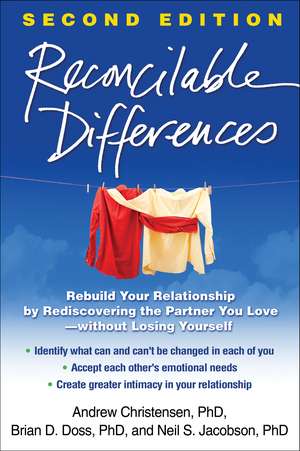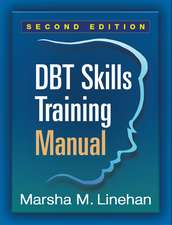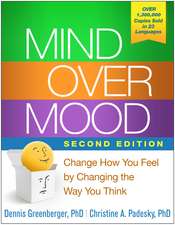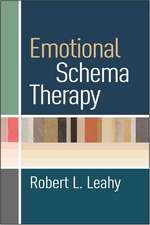Reconcilable Differences, Second Edition: Rebuild Your Relationship by Rediscovering the Partner You Love--without Losing Yourself
Autor Andrew Christensen, Neil S. Jacobson, Brian D. Dossen Limba Engleză Paperback – 5 mar 2014
Every couple has disagreements, but what happens when recurring conflicts start to pull your relationship apart? Do you lie awake hoping that your spouse will eventually see things your way, or rehashing the evidence that you're right? Demand some immediate changes--or else? This popular, science-based guide offers powerful solutions for couples frustrated by continual attempts to make each other change. True acceptance may seem difficult to accomplish, but the clear-cut steps and thought-provoking exercises in this book can make it a reality. You'll learn why you keep having the same fights again and again; how to keep small incompatibilities from causing big problems; what communication strategies really work to resolve conflicts; and how to problem-solve and make positive changes--together. Updated throughout with new research, practical tools, and examples, the second edition features a new chapter on mindfulness.
Mental health professionals: visit http://ibct.psych.ucla.edu to learn about using this self-help guide as an adjunct to therapy.
Mental health professionals: visit http://ibct.psych.ucla.edu to learn about using this self-help guide as an adjunct to therapy.
Preț: 91.48 lei
Preț vechi: 96.29 lei
-5% Nou
Puncte Express: 137
Preț estimativ în valută:
17.51€ • 19.01$ • 14.71£
17.51€ • 19.01$ • 14.71£
Carte disponibilă
Livrare economică 01-15 aprilie
Livrare express 18-22 martie pentru 39.82 lei
Preluare comenzi: 021 569.72.76
Specificații
ISBN-13: 9781462502431
ISBN-10: 1462502431
Pagini: 348
Ilustrații: black & white illustrations
Dimensiuni: 152 x 229 x 25 mm
Greutate: 0.45 kg
Ediția:2 Rev ed.
Editura: Guilford Publications
Colecția Guilford Press
ISBN-10: 1462502431
Pagini: 348
Ilustrații: black & white illustrations
Dimensiuni: 152 x 229 x 25 mm
Greutate: 0.45 kg
Ediția:2 Rev ed.
Editura: Guilford Publications
Colecția Guilford Press
Public țintă
Professional Practice & DevelopmentNotă biografică
Andrew Christensen, PhD, is Professor of Psychology at the University of California, Los Angeles. Dr. Christensen has spent more than 30 years studying intimate relationships and working with couples in therapy. He has conducted extensive research on the impact of couple therapy, including the approach on which this book is based, which he developed with the late Neil S. Jacobson. Dr. Christensen and his wife, who live in Los Angeles, have two grown children.
Brian D. Doss, PhD, is Associate Professor of Psychology at the University of Miami, where he teaches and conducts research on couple therapy and romantic relationships. Dr. Doss lives in Miami with his wife and two children.
Neil S. Jacobson, PhD, was Professor of Psychology at the University of Washington until his death in 1999. The author or editor of numerous publications, Dr. Jacobson was one of the world's most widely cited family therapists.
Brian D. Doss, PhD, is Associate Professor of Psychology at the University of Miami, where he teaches and conducts research on couple therapy and romantic relationships. Dr. Doss lives in Miami with his wife and two children.
Neil S. Jacobson, PhD, was Professor of Psychology at the University of Washington until his death in 1999. The author or editor of numerous publications, Dr. Jacobson was one of the world's most widely cited family therapists.
Cuprins
I. The Conflicting Sides of Conflict
1. Three Sides to Every Story
2. You're Wrong!: Relationship Problems as Faults
II. A DEEP Understanding of Conflict: The Third Side of the Story
3. How Can You Be That Way?: Relationship Problems as Differences
4. You Know How to Hurt Me: Relationship Problems as Emotional Sensitivities
5. Can't You See I'm Stressed Out?: Relationship Problems as External Circumstances
6. A Cure Worse Than the Disease: Relationship Problems as Patterns of Communication
III. From Argument to Acceptance
7. The Delicate Balance: Acceptance and Change
8. A Story of Our Own: Acceptance through Understanding
9. Walking in Your Partner's Shoes: Acceptance through Compassion
10. Getting Some Perspective on the Conflict: Acceptance through Tolerant Distance
IV. Deliberate Change through Acceptance
11. The Dilemmas of Deliberate Change
12. Deliberate Change through Mindfulness: Custom-Fitting Change to Suit Your Relationship
13. Deliberate Change through Communication: Taking Good Advice about Talking and Listening with a Mindful Grain of Salt
14. The Silver Bullet of Deliberate Change: Taking Charge of Change Even When Things Go Bad
V. When Acceptance Is Not Enough
15. Don't Do That to Me!: Violence, Verbal Abuse, and Infidelity
16. Calling In the Professionals: Couple and Individual Therapy
Resources
Bibliography
1. Three Sides to Every Story
2. You're Wrong!: Relationship Problems as Faults
II. A DEEP Understanding of Conflict: The Third Side of the Story
3. How Can You Be That Way?: Relationship Problems as Differences
4. You Know How to Hurt Me: Relationship Problems as Emotional Sensitivities
5. Can't You See I'm Stressed Out?: Relationship Problems as External Circumstances
6. A Cure Worse Than the Disease: Relationship Problems as Patterns of Communication
III. From Argument to Acceptance
7. The Delicate Balance: Acceptance and Change
8. A Story of Our Own: Acceptance through Understanding
9. Walking in Your Partner's Shoes: Acceptance through Compassion
10. Getting Some Perspective on the Conflict: Acceptance through Tolerant Distance
IV. Deliberate Change through Acceptance
11. The Dilemmas of Deliberate Change
12. Deliberate Change through Mindfulness: Custom-Fitting Change to Suit Your Relationship
13. Deliberate Change through Communication: Taking Good Advice about Talking and Listening with a Mindful Grain of Salt
14. The Silver Bullet of Deliberate Change: Taking Charge of Change Even When Things Go Bad
V. When Acceptance Is Not Enough
15. Don't Do That to Me!: Violence, Verbal Abuse, and Infidelity
16. Calling In the Professionals: Couple and Individual Therapy
Resources
Bibliography
Recenzii
This deceptively simple book can change lives. You and your partner will learn numerous ways to accept each other and achieve a new level of happiness and comfort in your relationship. The genius of the book is that these techniques are not difficult, and they can help put an end to perpetual conflict.--Pepper Schwartz, PhD, coauthor of The Normal Bar: The Surprising Secrets of Happy Couples and What They Reveal about Creating a New Normal in Your Relationship
No matter how many books you have read to improve your relationship, read this one, and follow the research-based principles it presents! The authors are internationally known scientists who have produced a book that all couples need to read. It's not the differences between you and your partner that matter, but how you handle them, and this book shows exactly how and why.--Howard J. Markman, PhD, coauthor of Fighting for Your Marriage
There are lots of books for couples that make interesting reading, and some that provide specific, doable suggestions for improving your relationship, but just a handful--including this one--based on principles that have been scientifically shown to work. Any couple that wants to better understand and overcome problems in their relationship will find this book a great place to start.--W. Kim Halford, PhD, School of Psychology, University of Queensland, Australia
No matter how many books you have read to improve your relationship, read this one, and follow the research-based principles it presents! The authors are internationally known scientists who have produced a book that all couples need to read. It's not the differences between you and your partner that matter, but how you handle them, and this book shows exactly how and why.--Howard J. Markman, PhD, coauthor of Fighting for Your Marriage
There are lots of books for couples that make interesting reading, and some that provide specific, doable suggestions for improving your relationship, but just a handful--including this one--based on principles that have been scientifically shown to work. Any couple that wants to better understand and overcome problems in their relationship will find this book a great place to start.--W. Kim Halford, PhD, School of Psychology, University of Queensland, Australia
-One virtue of the book is its utter realism....Offers a slew of tools that couples can use to reconcile their differences without the help of a therapist. (on the first edition)--The New York Times, 4/18/2013ƒƒPacked with data, wisdom, and common sense. (on the first edition)--Milwaukee Journal Sentinel, 4/18/2013ƒƒGives several guides to building acceptance.(on the first edition)--USA Today, 4/18/2013ƒƒAn excellent book with much to offer about a well researched and well thought out application for couple therapy. (on the first edition)--Journal of Couple and Relationship Therapy, 4/18/2013
Descriere
Every couple has disagreements, but what happens when recurring conflicts start to pull your relationship apart? Do you lie awake hoping that your spouse will eventually see things your way, or rehashing the evidence that you're right? Demand some immediate changes--or else? This popular, science-based guide offers powerful solutions for couples frustrated by continual attempts to make each other change. True acceptance may seem difficult to accomplish, but the clear-cut steps and thought-provoking exercises in this book can make it a reality. You'll learn why you keep having the same fights again and again; how to keep small incompatibilities from causing big problems; what communication strategies really work to resolve conflicts; and how to problem-solve and make positive changes--together. Updated throughout with new research, practical tools, and examples, the second edition features a new chapter on mindfulness.
Mental health professionals: learn about using this self-help guide as an adjunct to therapy at the authors' website (http://ibct.psych.ucla.edu).
Mental health professionals: learn about using this self-help guide as an adjunct to therapy at the authors' website (http://ibct.psych.ucla.edu).












